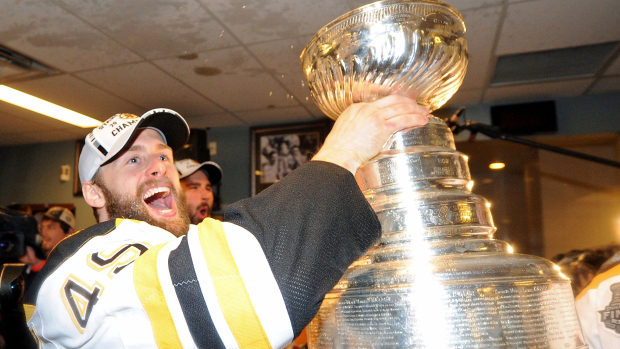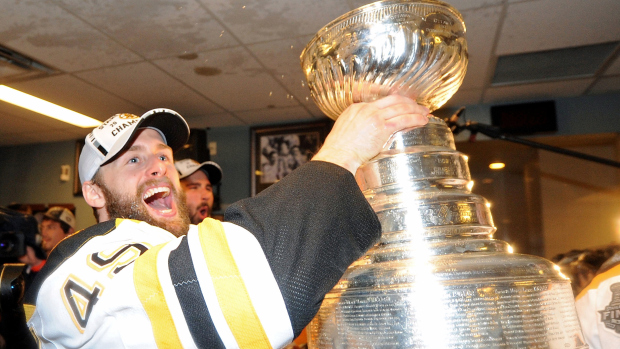There’s a great scene in the Marx Brothers movie, Monkey Business, where a mobster mistakenly hires Chico and Harpo as henchmen. He asks Chico how tough the two of them are and Chico responds:
You pay little bit, we’re little bit tough.
You pay very much, very much tough.
You pay too much, we’re too much tough.
How much you pay?
I pay plenty.
Then we’re plenty tough.
We all know that people who play sports are tough — it’s one of the things most sports fans admire about the players — but how tough is too tough? And what is the right way to respond as fans to that toughness?

This question came to the forefront this week when Rich Peverley, an ice hockey player on the Dallas Stars, collapsed during a game. His heart had stopped but thanks to the quick action of team doctors and his teammates who immediately piled onto the ice en masse in a successful effort to stop the game and signal the seriousness of the situation as quickly as possible, Peverley’s heart was restarted and he is in stable condition. Peverley had been diagnosed with an irregular heartbeat in a pre-season physical and had a procedure designed to fix it. The game was (rightly, in my mind) postponed by the NHL following the incident.
Soon after it was reported that Peverley was in stable condition, a story started floating around, sourced from the Dallas Stars twitter account:
Per Dr. Salazar, Peverley was aware of where he was when became conscious and wanted to get back in to the game.
— Dallas Stars (@DallasStars) March 11, 2014
As Deadspin commented, “The most Hockey dude ever is in stable condition at a Dallas hospital.”
And indeed, there is something admirable about Peverley’s determination to get back into the game at all costs. It’s similar to the admiration we have for hockey players like Patrice Bergeron who played the final game of last year’s playoffs for the Boston Bruins with broken ribs, torn rib cartilage, torn rib muscles, and a separated shoulder. It’s the admiration we have for basketball players who “walk-off” ankles that we’ve just seen bend in ways that shouldn’t allow their owners to be upright, much less playing a sport. It’s not limited to men either, who can forget gymnast Kerri Strug landing a vault on a broken ankle for the U.S. Women’s gymnastics team or U.S. Women’s National Team player Abby Wambach going up for headers while blood streamed down her head from an earlier injury. A big part of a fans enjoyment of sports comes from admiration for people willing and able to do things that you, the viewer, could not do. Playing through injuries is part of that.
There’s a flip-side to this toughness though. There are some injuries that shouldn’t be played through: head injuries and heart injuries or conditions seem like obvious candidates to us but they are routinely ignored and even hidden by players. Bruce Arthur of the National Post wrote an article about this (as well as the strange need of some hockey fans to denigrate other sports as less tough) yesterday. He writes of Peverley, “Asking to go back in wasn’t so much about toughness as a form of insanity.” He also reminds the reader that two basketball players, Hank Gathers and Reggie Lewis both died of heart problems on the court. When Peverley went down, many people thought of Jiri Fischer, a hockey player who was similarly brought back to life after a heart issue during a game, but there are other examples: Corey Stringer was a prominent football player who died of complications from heat stroke but there have been many others, Kris Letang, a player on the Pittsburgh Penguins, had a stroke this year resulting from a small hole in his heart. He is recovering now but managed to get to the training facility and fly with the team to an away game before the trainers found out and hospitalized him. The concussion story is well documented but it’s worth repeating that a big problem with preventing concussions, particularly the far more damaging second and third concussions in a short period, is that players at every level actively hide them from their coaches and trainers.
So, how tough is too tough in sports? I guess the answer is: when it comes to heads and hearts, don’t be tough; when it comes to anything else, be as tough as you want. That’s a pretty hard psychological change to ask athletes to make though: put the team before your knees, your legs, your arms, but not your head or your heart. It would be better to put structures in place in all sports that, without increasing the incentive of players to hide head and heart injuries, identified them and treated the players medically as people first and players a far distant second. I think it’s okay to enjoy a player whose heart tells him to get back into the game even after it’s just been shocked back to life as long as, as Barry Petchesky of Deadspin wrote, his coach, teammates, team doctors, and the league itself were all determined that it was “never, ever going to happen.”

